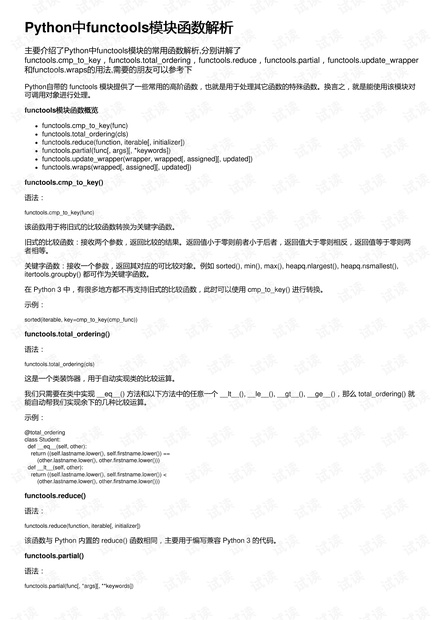Python中functools模块函数解析
主要介绍了Python中functools模块的常用函数解析,分别讲解了functools.cmp_to_key,functools.total_ordering,functools.reduce,functools.partial,functools.update_wrapper和functools.wraps的用法,需要的朋友可以参考下 ### Python中functools模块函数解析 #### 一、引言 `functools`是Python标准库中的一个重要模块,提供了许多高级功能来处理函数。本文将深入介绍`functools`模块中的一些常用函数,包括`cmp_to_key`、`total_ordering`、`reduce`、`partial`、`update_wrapper`和`wraps`。 #### 二、`functools.cmp_to_key` ##### 2.1 概述 `cmp_to_key`函数用于将传统的比较函数转换成适用于排序的关键字函数。Python 3不再支持旧式的比较函数(如`cmp`),因此`cmp_to_key`提供了一种向后兼容的方式。 ##### 2.2 语法 ```python functools.cmp_to_key(func) ``` ##### 2.3 使用场景 当需要将旧式比较函数转换为关键字函数时,可以使用此函数。例如,当你有一个`cmp`函数并希望将其用于`sorted()`函数或其他需要关键字函数的地方时。 ##### 2.4 示例 ```python def cmp_func(x, y): return (x > y) - (x < y) # 转换成关键字函数 key_func = functools.cmp_to_key(cmp_func) # 排序列表 sorted_list = sorted([5, 2, 9, 1], key=key_func) print(sorted_list) # 输出 [1, 2, 5, 9] ``` #### 三、`functools.total_ordering` ##### 3.1 概述 `total_ordering`是一个类装饰器,用于简化类中比较方法的定义。只需定义`__eq__`和另一个比较方法(如`__lt__`),`total_ordering`会自动为其他比较方法生成实现。 ##### 3.2 语法 ```python @functools.total_ordering class ClassName: # 定义__eq__和另一个比较方法 ``` ##### 3.3 使用场景 当自定义一个类并希望该类具有完整的比较能力时,可以使用`total_ordering`。 ##### 3.4 示例 ```python @functools.total_ordering class Student: def __init__(self, lastname, firstname): self.lastname = lastname self.firstname = firstname def __eq__(self, other): return ((self.lastname.lower(), self.firstname.lower()) == (other.lastname.lower(), other.firstname.lower())) def __lt__(self, other): return ((self.lastname.lower(), self.firstname.lower()) < (other.lastname.lower(), other.firstname.lower())) # 创建学生对象 s1 = Student("Doe", "John") s2 = Student("Smith", "Jane") # 比较学生 print(s1 < s2) # 输出 True ``` #### 四、`functools.reduce` ##### 4.1 概述 `reduce`函数是从列表的第一个元素开始,累积地应用函数到所有元素上,最终返回一个单一结果。 ##### 4.2 语法 ```python functools.reduce(function, iterable[, initializer]) ``` ##### 4.3 使用场景 当需要对列表中的所有元素执行某种累积操作时使用`reduce`。 ##### 4.4 示例 ```python from functools import reduce # 定义一个函数 def add(x, y): return x + y # 使用reduce计算列表的总和 result = reduce(add, [1, 2, 3, 4, 5]) print(result) # 输出 15 ``` #### 五、`functools.partial` ##### 5.1 概述 `partial`函数允许你预先设置一个函数的一部分参数,从而创建一个新的函数,这个新函数保留了原函数的特性,但参数被固定或减少。 ##### 5.2 语法 ```python functools.partial(func, *args, **keywords) ``` ##### 5.3 使用场景 当需要创建一个带有部分预设参数的新函数时使用`partial`。 ##### 5.4 示例 ```python from functools import partial def power(base, exponent): return base ** exponent # 创建一个求平方的新函数 square = partial(power, exponent=2) # 使用新函数 print(square(5)) # 输出 25 ``` #### 六、`functools.update_wrapper` 和 `functools.wraps` ##### 6.1 概述 这两个函数都用于更新包装器(即装饰器)的功能,确保装饰后的函数具有正确的元数据(如函数名、文档字符串等)。 ##### 6.2 语法 ```python functools.update_wrapper(wrapper, wrapped[, assigned][, updated]) functools.wraps(wrapped[, assigned][, updated]) ``` ##### 6.3 使用场景 当定义装饰器时,为了保持原始函数的信息,通常会使用`update_wrapper`或`wraps`。 ##### 6.4 示例 ```python from functools import wraps def my_decorator(func): @wraps(func) def wrapper(*args, **kwargs): print("Before function execution") result = func(*args, **kwargs) print("After function execution") return result return wrapper @my_decorator def say_hello(name): """Says hello to the given name.""" print(f"Hello, {name}!") say_hello("Alice") # 输出 "Before function execution"、"Hello, Alice!"、"After function execution" print(say_hello.__doc__) # 输出 "Says hello to the given name." ``` #### 七、总结 通过本文的介绍,我们了解了`functools`模块中的一些核心函数及其用途。这些函数不仅能够帮助我们更好地管理函数的行为,还能提高代码的可读性和可维护性。无论是在日常开发还是项目实践中,熟练掌握这些工具都将是非常有益的。

- 粉丝: 5
 我的内容管理
展开
我的内容管理
展开
 我的资源
快来上传第一个资源
我的资源
快来上传第一个资源
 我的收益 登录查看自己的收益
我的收益 登录查看自己的收益 我的积分
登录查看自己的积分
我的积分
登录查看自己的积分
 我的C币
登录后查看C币余额
我的C币
登录后查看C币余额
 我的收藏
我的收藏  我的下载
我的下载  下载帮助
下载帮助

 前往需求广场,查看用户热搜
前往需求广场,查看用户热搜最新资源
- 电气工程中电气自动化融合技术的应用研究.docx
- 山区配电网自动化建设及应用探讨.docx
- 大数据环境下人力资源管理应用.docx
- 大学公共计算机基础课程教学模式探讨.docx
- 计算机软件技术在气象业务中的应用分析.docx
- c语言课程设计-黑白棋对战.doc
- authorware的多媒体课件设计方案——完稿.doc
- 基于蒙特卡罗方法的贝叶斯优化算法.pptx
- 高中数学人教A版(浙江)选修2-2课件:121-2第2课时导数的运算法则.ppt
- WEB的酒店前台管理信息完整.doc
- 基于大数据的智能变电站二次状态监测系统研究.docx
- 商业地产项目管理操盘手册完整稿.doc
- 单片机的LCD液晶显示器控制原理系统设计方案[当文网提供].doc
- XX人寿IT战略规划项目管理实施效果预估.doc
- 东软学院三期网络设计及综合布线方.doc
- 拓宽渠道-因材施教-提高高职院校计算机教学质量.docx


 信息提交成功
信息提交成功
